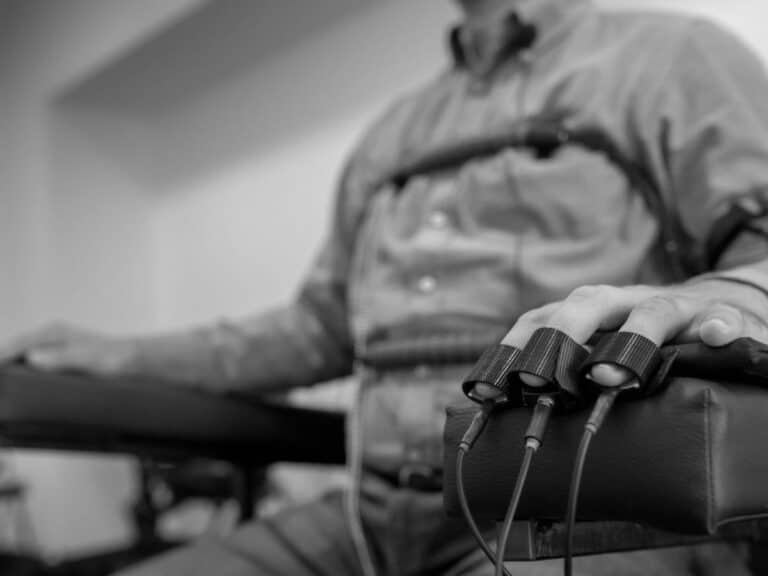Irrelevant Questions in Polygraph: Their Importance and Examples
Polygraph examinees answer 3 types of questions from the polygrapher during a lie detector test. They are control questions, relevant questions and irrelevant questions. And this brings us to a pressing question: is it necessary for polygraph examiners to ask irrelevant questions given that the way they’re called makes them appear unnecessary?
Irrelevant questions are polygraphy questions that are designed to give the polygraph examiner an idea of the differences in the polygraph examinee’s bodily processes when being truthful and when being deceitful. They cause no stress to answer, which is why the lie detector machine won’t pick up questionable physiologic reactions from the subject.
About to undergo a polygraph exam and want to ensure that you will recognize irrelevant questions when the polygrapher throws them your way for you to answer?
In this post, I will talk about everything you need to know about irrelevant questions, so read on!
Control Questions vs. Relevant Questions: Key Differences
Before we talk about irrelevant questions routinely asked during a lie detector exam, let’s briefly talk about control questions and relevant questions. Having an idea of what they are can help you understand irrelevant questions more and the important role they play in determining truth or deception.
Control questions are designed to make the person taking the polygraph exam feel uncomfortable. So much so that, in some instances, as a matter of fact, these questions can cause a subject to lie.
That’s because control questions tend to be about deeds that have something to do with the crime or misdemeanor being investigated. However, they have a broader scope and refer to the past. And to keep incrimination at bay, it’s not uncommon for many subjects to lie when answering control questions.
Have you ever stolen anything? Have you ever betrayed someone who trusted you? Have you ever lied to get out of trouble? These are some common examples of control questions.
Not too many people are willing to admit to some harmless accusations. This is most especially true if they are currently being accused of something that can ruin their reputation, such as stealing from the workplace or cheating on their spouses. Because of this, answering control questions can provoke quite strong bodily responses.
It’s exactly due to this why an examiner can tell that the examinee could be lying.
Relevant questions, on the other hand, are questions that relate specifically to the crime or misdemeanor that has caused an individual to be strapped to a polygraph machine.
Whether or not the blood pressure, heart rate, respiratory rate and sweating of the examinee will increase when encountering a relevant question will depend on whether or not he or she is lying. Someone who is being deceitful may have increased readings — lying can cause stress, which can increase various physiologic responses.
Someone who is being truthful, meanwhile, may have the same readings as when answering irrelevant questions.
The Purpose of Asking Irrelevant Questions
The reason why irrelevant questions are asked by the examiner during a polygraph test is simple: to establish a baseline reading for when the individual who is undergoing the procedure is telling the truth.
Here’s the truth: a lie detector machine, despite what it’s called, cannot really tell whether or not the examinee is lying. What it can do, however, is monitor all sorts of physiologic activities throughout the examination, which can have significant differences when the subject is being truthful and being deceitful.
Any increase in the readings, as a general rule of thumb, is a sign of deception.
In order for the physiologic processes for when the examinee is lying to be determined, it’s a must to figure out the readings for when he or she is telling the truth.
This is when the importance of asking some irrelevant questions comes in. Because they are so easy to answer and require absolutely no lying whatsoever, irrelevant questions do not cause the individual’s stress levels to spike. And that is why asking them allows the examiner to establish the reading for when the examinee is being honest.
Is your name (name of the examinee)? Are you (age of the examinee) years old? Is today (day of the week)? Are you currently sitting down? These are some common examples of irrelevant questions.
Because they are so easy to answer that you will simply have to say “yes”, these questions asked during a lie detector test will not leave you feeling uncomfortable and guilty, thus keeping your measurable physiologic processes from being all over the place. Unless you are really anxious, irrelevant questions allow the examiner to know your normal vitals.
Consider the following series of questions:
- Are you known as (name of the examinee)?
- Are you (age of the examinee) years old today?
- Am I standing beside you right now?
- Have you ever stolen something from a family member?
The first 3 questions, obviously, are irrelevant questions — there’s nothing about them that can cause the subject to feel uncomfortable or ashamed and induce him or her to tell a lie.
On the other hand, the last question in the series is clearly a control question. As discussed earlier, a control question is something that can be difficult for examinees to answer, at times leaving them with no other choice but to lie just to make sure that nothing they say can connect them to the crime or misdemeanor being investigated.
With the readings substantially higher during the last question than in the first 3 ones, there’s a reason for the polygraph examiner to suspect that the individual is lying.
Let’s take a look at the same series of questions again, but this time with an additional question:
- Are you known as (name of the examinee)?
- Are you (age of the examinee) years old today?
- Am I standing beside you right now?
- Have you ever stolen something from a family member?
- Did you steal the $10,000 from the company’s funds?
It’s apparent that the last question is a relevant question — it has something to do with the reason why the examinee is taking the lie detector test in the first place.
Someone who is guilty and answers “no” to that question will have increased readings similar to when he or she answered the control question which preceded it. On the other hand, someone who is innocent and answers “no” to it will have the same readings as those when he or she answered the preceding irrelevant questions.
Just Before You Answer Irrelevant Questions
During a lie detector test, not all questions the examinee or subject will have to answer are crime- or misdemeanor-related ones. In order to be able to establish a baseline reading, the examiner will also ask irrelevant questions, the kinds that cause no stress or nervousness to answer.
By asking irrelevant questions as well as control and relevant questions, the person who is administering the polygraph test can have a much better idea of the individual’s readings when he or she is being truthful.
Related Questions
Will a lie detector test examiner tell you if you failed?
The polygraph examiner will not tell you on the spot if you passed or failed the test. He or she, however, will provide you with a verbal report of the examination. The written report, on the other hand, will be sent to you after a few days, particularly after it’s been reviewed by another examiner.
Can you lie on a polygraph test and still pass?
It’s possible for you to lie while strapped to a polygraph machine and still pass the examination. This is especially true if you can influence your physiologic processes by remaining calm and relaxed when being deceitful. The result is called a false negative if a guilty person passes the lie detector test.






